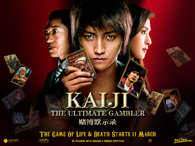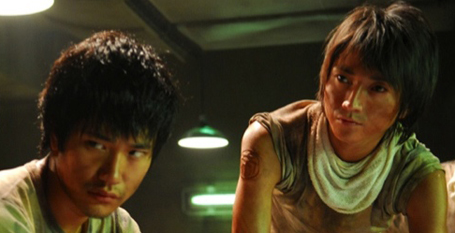
It would be fine to watch Kaiji as a typical escapist manga to screen adaptation, and milk it for its entertainment value. After all, that’s what the cast of Death Note have been brought back to do. You can indeed sustain your entertainment dollar on the succession of novel gambling games Kaiji is forced to play for his survival, but things start getting really interesting when this movie shifts at times into a playful commentary on the nature of modern capitalism, work, and consumer society – especially in the surreal middle segment of the film, which takes place in the underground prison empire of the aforementioned madman.
In a way, Kaiji plays like a latter-day Weimar cinema offering, with its depiction of routine humiliation and degradation of Japan’s freeters (embodied in the titular Kaiji), the exaggerated Schopenhauerian philosophy of the film’s ultimate villain and madman, and the ritual battle to the death pitting the strong and clever against the weak. Part of the thrill is to see classic scenes from Metropolis reworked in a Japanese pulp film; the other part is to see the social concerns of the Weimar republic re-stated in a modern Japanese context.
Like most Japanese manga to screen adaptations, do expect a fair amount of overacting and over-dramatic presentations. Thankfully the director is astute enough to add depth to his storytelling, but credit for holding the film together and grounding it in some reality also has to be given to the charismatic and chilling performance by Amami Yuki, a graduate of the all-female Takarazuka Revue theatre troupe.












 列印版本
列印版本










讀者回應
搶先發表第一個回應吧!
請先登入再使用此功能。